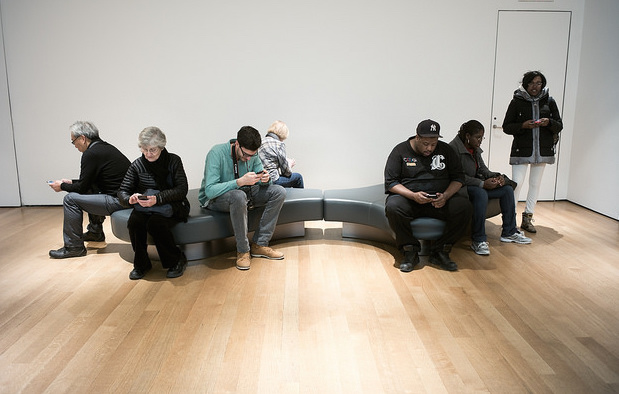Like this article? rabble is reader-supported journalism. Chip in to keep stories like these coming.
Back in the spring of 2001, I was sitting in lovely restaurant in Barcelona, Spain. Pure white napkins on the table; older men — professional waiters — hovering in the wings. An evening meal about to be served. And, scattered throughout the dining room, faces turned downward, faintly illuminated by the screens of cellphones.
This was before texting had really taken off in North America. So, I was fascinated to see the beautifully dressed Spanish and Catalan folks around me clearly texting with a nonchalant expertise as their companions chatted amiably. It was, it seemed, as natural to all of them as reading a menu. Rube that I was, I was fascinated by the acceptance of a behaviour that would not only have been a novelty in Canada, but would have been seen as unspeakably rude.
About the same time, the Philippines was dubbed the texting capital of the world. It was quite common to see folks texting in church and SMS messages were an important part of evangelizing the Catholic faith, especially among young Filipinos. The small country, even back then, boasted 65.4 million text messages a day. And, text messaging played an important role in the 2001 overthrow of the Estrada government — a cultural development decades ahead of the same technology’s role in uprisings in the Middle East.
All of this comes to mind because of a Pew Research study about North American attitudes towards the use of smartphones in public.
The most interesting results, for me, were that 82 per cent of the over 3,000 phone users surveyed thought using a smartphone in a social situation hurts conversation, but 89 per cent said they used their phone in exactly the same kinds of social situations.
So, are people who think smartphones hurt social but use their phones in social situations hypocrites or misanthropes?
I don’t think so. We all tend to find other people’s behaviour more annoying than our own — including burping, farting, interrupting or checking Facebook while waiting for a salad. But, combined with the survey’s results that suggest mostly older folks (especially older, white women) find social smartphoning annoying, I think we are seeing signs that over time, social use of smartphones will become more and more accepted. Which is, I think, a good thing.
Let’s consider the restaurant. I don’t have children, but I constantly see parents with children in restaurants interrupt adult conversations to “take a call” from the youngster beside him or her. I see them engaged in long conversations with the child at the expense of the adult conversation around the parent. Does that mean the child shouldn’t be in the restaurant or the parent should ignore the child while dining? Of course not. Even though, as my Facebook friend Marlene points out, children don’t come with “mute, silent or off settings.”
And, yes, I am comparing the interactions of a child and parent with the interactions of an adult and a smartphone, because, in terms of the social dynamic at the restaurant table, they can be pretty equivalent — a small, sometimes annoying, object that demands attention and pulls an adult from the social flow.
Or, consider housepets at a home dinner party. And, again, I don’t have a pet, but I have seen, and have heard of, hosts who stop a conversation at the table to feed, admonish or cuddle a cat or dog, during dinner. Again, small object demanding social attention.
Is a smartphone, sometimes electronically attached to another adult (or group of adults) any less of a social actor than a child or pet? I don’t think so. Many smartphone users, especially younger ones, consider that they are socially both in the real world, here and now, and equally “here” in social virtual space.
And, as someone who has a smartphone but not a child or pet, am I not equally as biased towards giving the smartphone social agent status as a parent or pet owner might be for their own social objects of affection?
In other words, isn’t it time, like the Filipinos texting in church, that we come to understand smartphones and their use in social situations as a part of the social fabric, not a tear in it?
Listen to an audio version of this column, read by the author, here.
Wayne MacPhail has been a print and online journalist for 25 years, and is a long-time writer for rabble.ca on technology and the Internet.
Photo: Susan Sermoneta/flickr
Like this article? rabble is reader-supported journalism. Chip in to keep stories like these coming.



